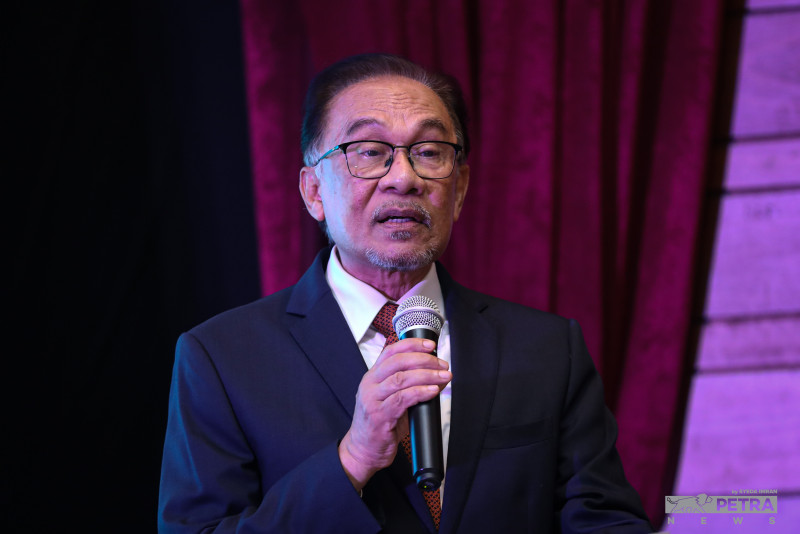PM rejects claims of Govt interference in judiciary amid retirement speculations
1 day ago
PRIME MINISTER Datuk Seri Anwar Ibrahim has firmly denied allegations of interference in the judiciary, asserting that the government fully respects the process, stature and independence of the institution as enshrined in the Federal Constitution.
Speaking at the monthly assembly with Prime Minister’s Department staff on Monday, Anwar cautioned against politicising the appointment or extension of public officials, including judges.
“There are procedures in place when any civil servant or judge reaches retirement. Retirement does not lead to an automatic extension of service,” he said.
“In this instance, I have been criticised. There is even a campaign – must extend, must not extend. How is this acceptable? An institution meant to uphold integrity and independence has been politicised,” he added.
Anwar warned that such behaviour risks reducing the process of extending or terminating appointments into a barometer for political loyalty.
“If there’s no extension, one group agrees. If there is an extension, the same group agrees. It’s not right,” he said.
“When a case is extended, it's called betrayal. When not extended, it's also called betrayal. If you were in the position of Prime Minister… well, just accept it. Be patient.”
He stressed that there should be no political campaigns or pressure concerning public service appointments, including those within the judiciary.
“Imagine if, six months before retirement, a civil servant like the Chief Secretary to the Government (Tan Sri Shamsul Azri Abu Bakar) is subjected to a full-blown campaign. If not extended – betrayal. If extended – also betrayal. That cannot happen and has never happened before. Nor should it.”
Rejecting claims that such decisions rest solely with the Prime Minister, Anwar explained that judicial appointments involve multiple layers of constitutional checks.
“This is not the sole power of the Prime Minister. If you understand the Constitution, you would know the process.
“There’s the commission, the Prime Minister, the Yang di-Pertuan Agong. New appointments must receive royal assent and be brought to the Conference of Rulers for deliberation. These procedures must be followed.”
Anwar further emphasised his stance of non-interference in judicial matters and confirmed that his only formal engagement is with the Chief Justice.
“That’s why I avoid meeting any senior judges, except for the Chief Justice, and only for official discussions,” he said.
“I’m thankful that our relationship and discussions have been cordial. Interpretations beyond that are irrelevant. I’ve never interfered in judicial matters. Whatever the judges decide, that is their call – not mine. Yet even this has been politicised.”
He cited two high-profile cases involving former Prime Minister Datuk Seri Najib Tun Razak and Muar MP Syed Saddiq Syed Abdul Rahman, both of whom were granted discharge not amounting to acquittal (DNAA), to illustrate how judicial decisions are routinely politicised.
“If Najib receives a DNAA, I’m accused of interference and betrayal – wrong.
“Then Syed Saddiq recently received a DNAA – also wrong, according to another side.
“If there’s no DNAA – again, wrong. I say this is not my business. Whether I agree or not is irrelevant. We must respect the judges’ decisions.”
Reflecting on his own legal ordeal in the past, Anwar said he had endured an unjust investigation and trial process.
“Back then, I knew. I was a victim. Even before being charged or even before a police report was filed – I was arrested. The building didn’t even exist yet.
“For those who followed my case, no police report had been lodged, yet I was detained. We must not repeat those mistakes.”
Calling for the defence of judicial and civil service integrity, Anwar urged all parties to avoid letting political sentiment dictate outcomes.
“We must defend our institutions – not based on political preferences or groups. In any case, there will be elite legal groups who agree, and religious bodies who disagree.
“I’m not swayed by either. These elite groups are articulate in the media, but the objections from religious bodies are also strong. I read both, but they should not influence us.”
The Prime Minister reaffirmed that the government values all views but remains guided by due process and the principles of law.
“Any decision on an extension requires the Prime Minister to consult the Yang di-Pertuan Agong for royal assent. The same applies to new appointments, which must then be presented to the Conference of Rulers,” he said.
The comments come amid speculation surrounding the status of Chief Justice Tun Tengku Maimun Tuan Mat, who is due for mandatory retirement this Wednesday upon turning 66, the compulsory retirement age for judges. Her final working day falls on Tuesday.
Under Article 125(1) of the Federal Constitution, judges of the Federal Court retire at 66 but may have their term extended by up to six months with the King’s consent. - June 30, 2025
...Read the fullstory
It's better on the More. News app
✅ It’s fast
✅ It’s easy to use
✅ It’s free
.png)







